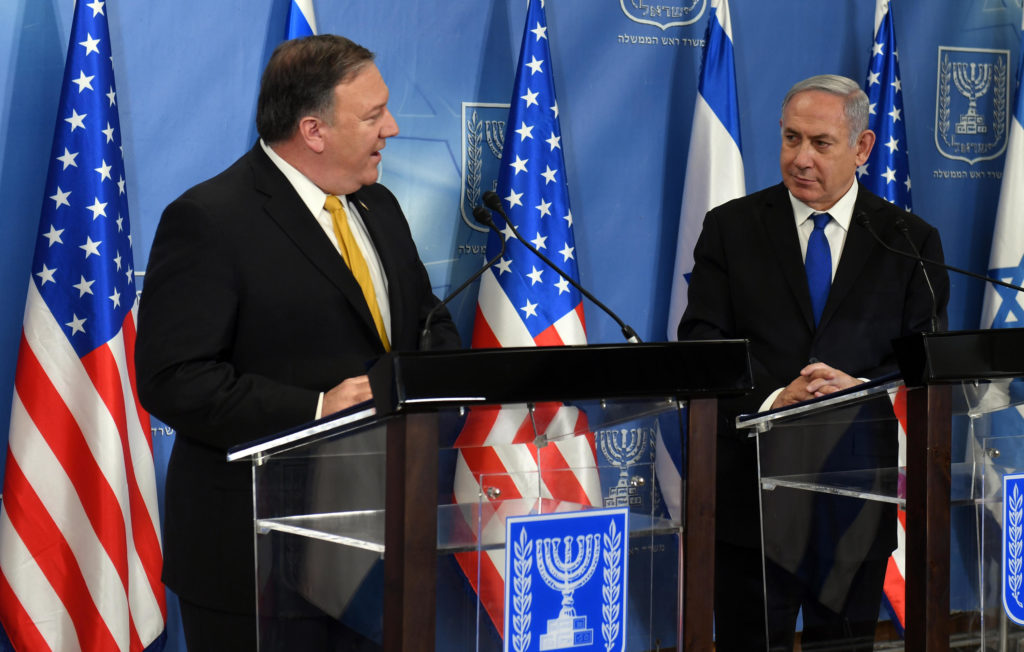
After the United Nations refused to extend the arms embargo on Iran that expires next month, the United States announced on Saturday that they were enforcing a renewal of a variety of sanctions Iran, including those related to weapons sales. The so-called “snapback” of sanctions was put into the 2015 Iran nuclear deal as a response if Iran violated the accord. On Saturday, the US threatened to sanction those who evade the sanctions, which covers arms deals, transferring technologies to Iran related to the nuclear and missile realms, and banning Iran from nuclear fuel enrichment and developing and testing ballistic missiles.
The unilateral move comes after the US announced their intent to effect the sanctions snapback 30 days ago on August 20. The US had previously exited the nuclear deal, known as the Joint Comprehensive Plan of Action (JCPOA), due to problems with the agreement, and Iran has withdrawn from multiple nuclear commitments under the JCPOA in response, moving them closer to nuclear weapons capability.
“The United States took this decisive action because, in addition to Iran’s failure to perform its JCPOA commitments, the Security Council failed to extend the UN arms embargo on Iran, which had been in place for 13 years,” US Secretary of State Mike Pompeo said in comments released by the State Department on Saturday. “The Security Council’s inaction would have paved the way for Iran to buy all manner of conventional weapons on October 18. Fortunately for the world, the United States took responsible action to stop this from happening.”
In a series of Twitter posts, Israeli Foreign Minister Gabi Asheknazi welcomed the American announcement. After thanking US President Donald Trump and Pompeo for keeping the Iran arms embargo in place, Ashkenazi tweeted, “I call upon all countries to stand alongside the US, in avoiding the sale of weapons to Iran and enforcing the sanctions in their entirety.”
In particular, Ashkenazi highlighted allies in Europe, the so-called E3 nations of Germany, the United Kingdom, and France, who are partners to the Iran nuclear JCPOA deal. The top Israeli diplomat’s tweet called upon the European countries to “pullback their opposition and work towards a rigorous implemention of the sanctions regime, both on state level, as well as on the EU level and within the UN bodies.”
However, so far those European nations have ardently rejected the American sanctions snapback. The E3 on Sunday highlighted the US decision in 2018 to end its participation in the JCPOA, arguing in a statement published by the German Federal Foreign Office that this makes the US move under the UN resolution authorizing the JCPOA “incapable of having legal effect.”
The E3 rejection of the US snapback of sanctions comes as the Europeans have so far failed to bring the Iranians back to adherence to the nuclear requirements under the JCPOA. The E3 started efforts under the JCPOA to trigger the so-called “dispute mechanism” back in January with their “hope” to “bring Iran back into full compliance with its commitments under the JCPoA,” per statement published on January 14 by the German Federal Foreign Office. Yet eight months later, the Europeans have failed to convince Iran to change course.
Instead Iran was on the brink of receiving a major benefit of the JCPOA with the expiration of the arms embargo. Pompeo, in his comments on Saturday, said, “Were it not for US action to restore UN measures, the Iranian regime would soon be able to buy and sell weapons more freely across the globe.”
The E3 statement on Sunday said they “have worked tirelessly to preserve the nuclear agreement and remain committed to do so,” but the US view is that the deal itself has proven to be a failure.
“The 2015 nuclear deal did not induce Iran to join ‘the community of nations’ as promised. Instead, the mullahs took their newfound wealth and used it to foment death and destruction from Yemen to Iraq to Lebanon and Syria—a predictable outcome,” said Pompeo.
“…Because of the failures of the JCPOA, Iran is nearly five years closer to the expiration of restrictions on Iran’s uranium enrichment program and reprocessing-related activities, bringing it unacceptably close to a dangerous nuclear breakout capability. However, thanks to the snapback of UN sanctions, Iran is now obligated to suspend enrichment, reprocessing, and heavy-water-related activities. We will never let the world’s leading state sponsor of terror obtain the world’s most deadly weapon.”
(By Joshua Spurlock, www.themideastupdate.com, September 20, 2020)
